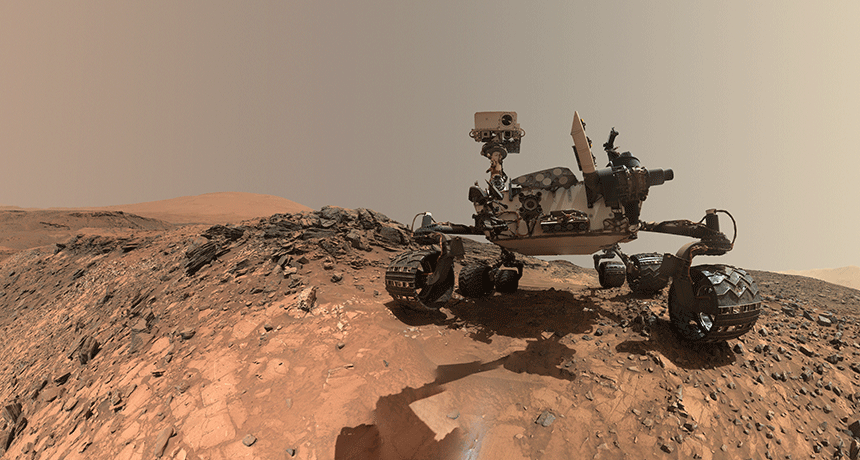Space
-
 Space
SpaceHalf the Milky Way may be stolen material
A galaxy may import up to half of its atoms from other celestial bodies. That suggests much of our Milky Way has foreign origins, new simulations suggest.
-
 Planets
PlanetsWhat the Curiosity rover has learned about Mars so far
Scientists take stock of what the Curiosity rover has learned after five years on Mars — and what else it may turn up in the next year or so.
-
 Physics
PhysicsEarly solar system may have slung giant mud balls
The first asteroids may have been great balls of mud. That could solve some puzzling traits of meteorites.
-
 Space
SpaceNewfound stars rank as farthest and one of the smallest
Astronomers have found two stars for the record books — the most distant ever observed and one of the tiniest now known.
By Emily Conover and Lisa Grossman -
 Materials Science
Materials ScienceRobot grippers imitate gecko feet to help nab space junk
NASA is testing robotic, gecko-inspired gripper hands that might one day help clean up space junk.
-
 Space
SpaceEarly moon may have had metallic skies and gale-force winds
A glowing infant Earth could have heated the early moon’s metals to create an atmosphere.
-
 Planets
PlanetsSmall, distant worlds are either big Earths or little Neptunes
The Kepler space telescope data are in. They split Earth-like exoplanets into two groups and reveal 10 new rocky planets in the ‘Goldilocks’ zone.
-
 Planets
PlanetsJupiter may be the solar system’s oldest planet
Jupiter’s early existence may explain the odd arrangement of planets in the solar system, a new study suggests.
-
 Planets
PlanetsHot, hot planet sets sizzling new record
Astronomers have discovered an odd new exoplanet. Called KELT 9b, is the hottest non-star known.
-
 Physics
PhysicsGravitational waves detected yet again
For the third time in 16 months, scientists have announced detection of gravitational waves washing over the spacetime environment in which Earth resides. This seems to show that such waves may not be rare.
-
 Planets
PlanetsJupiter gets surprisingly complex new portrait
NASA’s Juno spacecraft has sent back unexpected details about Jupiter, giving scientists their first close-up of this gas giant.
-
 Space
SpaceHow the solar system’s tail disappeared
A bubble envelops the planets and other material in the solar system. New data show it does not have a long tail but is round.